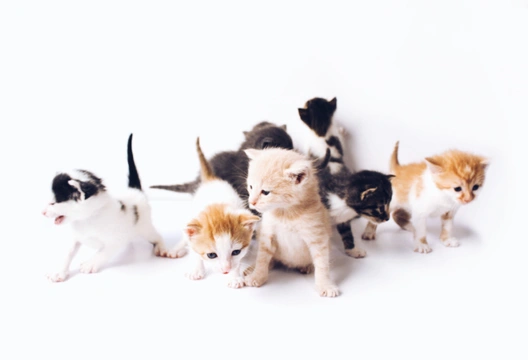
Why you should get your kitten neutered at 4 months
With their fluffy toe beans, soothing purring noises and buckets of character, it's no wonder that cats are considered a great family pet. But what happens when your gorgeous ball of fluff surprises you one day, presenting to you their unexpected offspring?
There's no doubt that kittens are amazing and their antics are fun to watch, however unexpected litters can come at a cost both financially and emotionally. Unfortunately as with any procreation, things are not always as straightforward as you may want them to be, leaving new kitten owners footing the bill or desperately seeking support from charitable organisations to help get the medical care and attention so desperately needed.
According to the report Cats and Their Stats 2021, there are currently 10.8 million pet cats in the UK, with 26% of households owning at least 1 kitty. The PAW Report 2021 also estimated that there are currently a whopping 1 million cats still unneutered in the UK.
World Spay Day usually held on the last Tuesday in February each year marks a date in the animal welfare calendar where charities and vets globally rally around arranging events and creating promotions that advocate spaying or neutering as a proven means of saving the lives of companion animals, community (feral and stray) cats, and street dogs to prevent them from ending up on the streets as strays or in shelter care. Here in the UK World Spay Day is overseen by International Cat Care and a variety of charities have come together under the umbrella of Cat-Kind to mark the occasion and work together to improve neutering rates and positively impact upon cat health and welfare.


Cat reproduction - 7 facts you probably don't know
Kittens, as cute as they are, add an extra burden to rescue shelters which already have thousands of cats waiting for homes. Knowing some key facts around the reproductive behaviour of cats can help you, your cat and the efforts that go into managing cat populations.
- Kittens can have kittens! Cats can reach sexual maturity and get pregnant at just four months of age.
- Cats are seasonal breeders and enter their reproductive cycle at a certain time of year. In the UK, this generally begins in Spring as daylight starts to lengthen, and stops in late Autumn when daylight is reduced. This explains why litters of kittens are typically seen between April and September.
- Female cats 'queens' will signal that they are ready to mate or 'in heat' by becoming more active and quite noisy! Usually, she'll do lots of rubbing, rolling and attention-seeking behaviours. You will probably see her arch her back downwards with her hindquarters raised, which is called 'lordosis'.
- Females can be mated by more than one male within a short period of time and this includes relatives, even her father and brother.
- Mating doesn't take long between cats, so it's easy to be caught out!
- Cats don't 'need' to have a litter of kittens; there are no proven health or welfare benefits.
- There are lots of health benefits to neutering, including a big reduction in the risk of getting FIV (the cat version of HIV/.
Don't forget to get your kitten neutered at 4 months
The best way to avoid unwanted litters and to protect your cat is to get him or her neutered at four months of age. This procedure, often called spaying in females and the snip in males, requires an anaesthetic but is fairly simple and your cat can be brought home the same day! If you worry that your cat may have been mated, it's not too late to act, so contact your vet as soon as possible for advice.
In some areas of the UK vets professionals may have a small waiting list for neutering appointments at this time, if this is the case in your locality we would encourage you to keep your cats entertained indoors and ask that you are patient with your vets practitioners who are doing their best to respond to routine appointment after a period of changes to service provision during the peak of the pandemic.
This article was written by the RSPCA, to learn more about their work with animal welfare and cats - click here!



